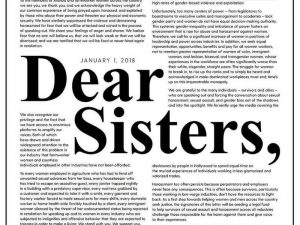 On Monday, a group of powerful women in Hollywood launched a campaign to help fight sexual harassment in the film industry and other workplaces. The campaign, Time’s Up, was announced in a full page ad placed in the New York Times. The ad, an open letter from the group, was a show of support and solidarity from the women of Hollywood to working-class women, and signed by hundreds of women in the film industry. The letter called for a “significant increase of women in positions of leadership and power across industries, and equal representation, opportunities and pay for all women workers, and greater representation for women of color, immigrant women and lesbian, bisexual and transgender women. The struggle for women to break in, to rise up the ranks and to simply be heard and acknowledged in male-dominated workplaces must end; time’s up on this impenetrable monopoly,” the letter says.
On Monday, a group of powerful women in Hollywood launched a campaign to help fight sexual harassment in the film industry and other workplaces. The campaign, Time’s Up, was announced in a full page ad placed in the New York Times. The ad, an open letter from the group, was a show of support and solidarity from the women of Hollywood to working-class women, and signed by hundreds of women in the film industry. The letter called for a “significant increase of women in positions of leadership and power across industries, and equal representation, opportunities and pay for all women workers, and greater representation for women of color, immigrant women and lesbian, bisexual and transgender women. The struggle for women to break in, to rise up the ranks and to simply be heard and acknowledged in male-dominated workplaces must end; time’s up on this impenetrable monopoly,” the letter says.
The group was formed in early October, after the bombshell Harvey Weinstein report and after more women began to step forward and other prominent men in the industry were accused of abuse. Actress and producer Reese Witherspoon said to the New York Times that her work with Time’s Up has allowed her an opportunity to meet regularly with other women in Hollywood, which is a rarity in an industry heavily dominated by men. “We have been siloed off from each other,” Ms. Witherspoon said. “We’re finally hearing each other, and seeing each other, and now locking arms in solidarity with each other, and in solidarity for every woman who doesn’t feel seen, to be finally heard.”
In November, an open letter was sent on behalf of 700,000 female farmworkers who said they stood in solidarity with the women of Hollywood in their fight against sexual harassment. Show runner Shonda Rhimes, the executive producer of television heavyweights, Grey’s Anatomy, Scandal and How to Get Away With Murder said the letter further inspired the group to fight sexual harassment and gendered abuses in Hollywood and beyond. It’s very hard for us to speak righteously about the rest of anything if we haven’t cleaned our own house,” Rhimes said. “If this group of women can’t fight for a model for other women who don’t have as much power and privilege, then who can?”
Other Time’s Up members include actresses Ashley Judd, Eva Longoria, America Ferrera, Natalie Portman, Rashida Jones, Emma Stone, Kerry Washington and Reese Witherspoon; Donna Langley, chairwoman of Universal Pictures; and lawyer Tina Tchen, who served as Michelle Obama’s chief of staff. The group totals hundreds of women in New York, Los Angeles, London and other cities.
The group is leaderless, volunteer-run and consists of several working groups tasked with things like creating a blueprint to ending sexual harassment in the film industry. The Time’s Up initiative also includes a legal defense fund, backed by $13 million in donations, that was set up to help less privileged women protect themselves from the repercussions of reporting sexual harassment. Major donors to the legal defense fund include Reese Witherspoon, Shonda Rhimes, Meryl Streep, Steven Spielberg and Kate Capshaw, and talent agencies ICM Partners and the Creative Artists Agency among others. The initiative also includes spearheading legislation to penalize companies that tolerate persistent harassment, and to discourage the use of nondisclosure agreements meant to silence victims of harassment; a push to reach gender parity at film studios and talent agencies; and a request that women on the Golden Globes red carpet speak out and raise awareness by wearing black.
The campaign aims to say enough is enough — in Hollywood and beyond. For too long, systemic and pervasive abuse has been allowed to continue. This impacts women and girls everywhere, from women in Hollywood, to farm workers in rural areas, to female factory workers at Ford Motor Company in Chicago. Sexual harassment is hard to talk about and even harder to deal with at times, but with initiatives like Time’s Up, and other grassroots movements like #MeToo and so on, I’m confident that this watershed moment and societal shift that began back in October 2017 will only grow stronger until the systems that allowed this kind of abuse are permanently dismantled for future generations. Maybe that’s a little naïve and idealistic of me, but when I look at the lives of girls of fifty years ago, and the lives of girls in 2018, I’m still hopeful that we can create a better world, and are creating it, one step at a time.
-Sage Daugherty
Associate Editor
Girl Museum Inc.
